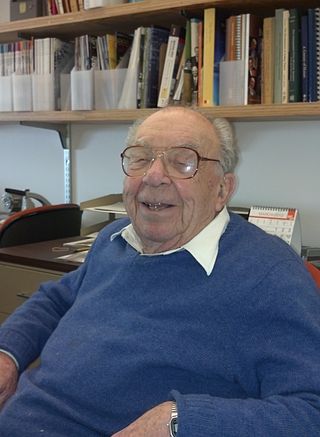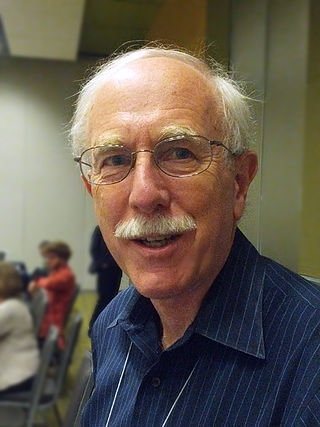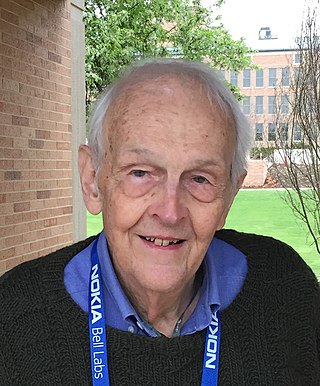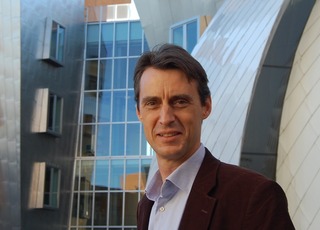Related Research Articles

Roberto Mario "Robert" Fano was an Italian-American computer scientist and professor of electrical engineering and computer science at the Massachusetts Institute of Technology. He became a student and working lab partner to Claude Shannon, whom he admired zealously and assisted in the early years of Information Theory.

Robert Gray Gallager is an American electrical engineer known for his work on information theory and communications networks.
Lawrence R. Rabiner is an electrical engineer working in the fields of digital signal processing and speech processing; in particular in digital signal processing for automatic speech recognition. He has worked on systems for AT&T Corporation for speech recognition.
Ronald W. Schafer is an American electrical engineer notable for his contributions to digital signal processing.
Thomas Kailath is an Indian born American electrical engineer, information theorist, control engineer, entrepreneur and the Hitachi America Professor of Engineering emeritus at Stanford University. Professor Kailath has authored several books, including the well-known book Linear Systems, which ranks as one of the most referenced books in the field of linear systems.

James H. McClellan is the Byers Professor of Signal Processing at the Georgia Institute of Technology. He is widely known for his creation of the McClellan transform and for his co-authorship of the Parks–McClellan filter design algorithm.

Thomas Shi-Tao Huang was a Chinese-born American computer scientist, electrical engineer, and writer. He was a researcher and professor emeritus at the University of Illinois at Urbana-Champaign (UIUC). Huang was one of the leading figures in computer vision, pattern recognition and human computer interaction.
Alan Victor Oppenheim is a professor of engineering at MIT's Department of Electrical Engineering and Computer Science. He is also a principal investigator in MIT's Research Laboratory of Electronics (RLE), at the Digital Signal Processing Group.

Richard "Dick" Francis Lyon is an American inventor, scientist, and engineer. He is one of the two people who independently invented the first optical mouse devices in 1980. He has worked in signal processing and was a co-founder of Foveon, Inc., a digital camera and image sensor company.

Kamisetty Ramamohan Rao was an Indian-American electrical engineer. He was a professor of Electrical Engineering at the University of Texas at Arlington. Academically known as K. R. Rao, he is credited with the co-invention of discrete cosine transform (DCT), along with Nasir Ahmed and T. Natarajan due to their landmark publication, Discrete Cosine Transform.

James Frederick Kaiser was an American electrical engineer noted for his contributions in signal processing. He was an IEEE Fellow and received many honors and awards, including the IEEE Centennial Medal, the IEEE W.R.G. Baker Award, the Bell Laboratories Distinguished Technical Staff Award, and the IEEE Jack S. Kilby Signal Processing Medal.
Fumitada Itakura is a Japanese scientist. He did pioneering work in statistical signal processing, and its application to speech analysis, synthesis and coding, including the development of the linear predictive coding (LPC) and line spectral pairs (LSP) methods.

Hisashi Kobayashi was the Sherman Fairchild University Professor of Electrical Engineering and Computer Science, emeritus at Princeton University in Princeton, New Jersey. His fields of expertise included applied probability; queueing theory; system modeling and performance analysis; digital communication and networks; network architecture; investigation of the Riemann hypothesis; and stochastic modeling of an infectious disease. He was a Senior Distinguished Researcher at the National Institute of Information and Communications Technology (NICT), Japan from September 2008 to March 2016.

John Mathew Cioffi is an American electrical engineer, educator and inventor who has made contributions in telecommunication system theory, specifically in coding theory and information theory. Best known as "the father of DSL," Cioffi's pioneering research was instrumental in making digital subscriber line (DSL) technology practical and has led to over 400 publications and more than 100 pending or issued patents, many of which are licensed.

Vincent Daniel Blondel is a Belgian professor of applied mathematics and current rector of the University of Louvain (UCLouvain) and a visiting professor at the Massachusetts Institute of Technology (MIT). Blondel's research lies in the area of mathematical control theory and theoretical computer science. He is mostly known for his contributions in computational complexity in control, multi-agent coordination and complex networks.
Carol Yvonne Espy-Wilson is an electrical engineer and Professor of Electrical and Computer Engineering at the University of Maryland (UMD) at College Park. She received her Ph.D. in Electrical Engineering from the Massachusetts Institute of Technology in 1987.

Nasir Ahmed is an Indian-American electrical engineer and computer scientist. He is Professor Emeritus of Electrical and Computer Engineering at University of New Mexico (UNM). He is best known for inventing the discrete cosine transform (DCT) in the early 1970s. The DCT is the most widely used data compression transformation, the basis for most digital media standards and commonly used in digital signal processing. He also described the discrete sine transform (DST), which is related to the DCT.

S. Hamid Nawab is Professor of Electrical and Computer Engineering and Biomedical Engineering at Boston University who is a researcher, educator, and engineer in the signal processing and machine perception subfields of Electrical Engineering and their application to the machine/computer analysis of complex biosignals from auditory, speech, and neuromuscular systems.

John Makhoul is a Lebanese-American computer scientist who works in the field of speech and language processing. Dr. Makhoul's work on linear predictive coding was used in the establishment of the Network Voice Protocol, which enabled the transmission of speech signals over the ARPANET. Makhoul is recognized in the field for his vital role in the areas of speech and language processing, including speech analysis, speech coding, speech recognition and speech understanding. He has made a number of significant contributions to the mathematical modeling of speech signals, including his work on linear prediction, and vector quantization. His patented work on the direct application of speech recognition techniques for accurate, language-independent optical character recognition (OCR) has had a dramatic impact on the ability to create OCR systems in multiple languages relatively quickly.
Arthur Bernard Baggeroer is an American Electrical Engineer and emeritus Ford Professor of Engineering in the Departments of Mechanical Engineering and Electrical Engineering & Computer Science at the Massachusetts Institute of Technology.
References
- ↑ Goldstein, Andrew; Abbate, Janet (11 February 1997). "Oral History: James Kaiser". Center for the History of Electrical Engineering. IEEE. Retrieved 8 June 2017.
- ↑ "Professional Society Fellows". MIT Lincoln Laboratory. Retrieved 8 June 2017.
- ↑ "Staff Biographies: Thomas F. Quatieri". MIT Lincoln Laboratory. Retrieved 8 June 2017.
- ↑ "SHBT Faculty - Listing by Research Area". Harvard–MIT Program in Speech and Hearing Bioscience and Technology. Harvard University. Retrieved 8 June 2017.
- ↑ "Authors: Thomas F. Quatieri". InformIT. Retrieved 8 June 2017.